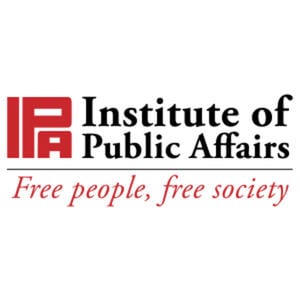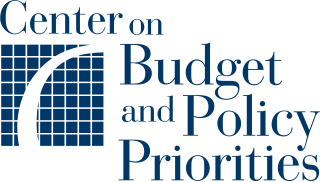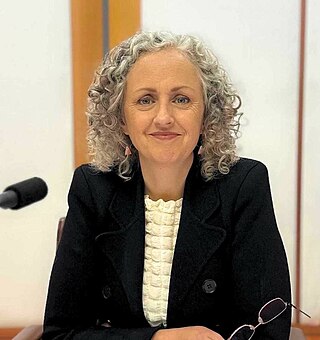Related Research Articles

A think tank, or policy institute, is a research institute that performs research and advocacy concerning topics such as social policy, political strategy, economics, military, technology, and culture. Most think tanks are non-governmental organizations, but some are semi-autonomous agencies within government, and some are associated with particular political parties, businesses or the military. Think tanks are often funded by individual donations, with many also accepting government grants.
New America, formerly the New America Foundation, is a liberal think tank in the United States founded in 1999. It focuses on a range of public policy issues, including national security studies, technology, asset building, health, gender, energy, education, and the economy. The organization is based in Washington, D.C., and Oakland, California. Anne-Marie Slaughter is the chief executive officer (CEO) of the think tank.

The Economic Policy Institute (EPI) is a 501(c)(3) non-profit American think tank based in Washington, D.C., that carries out economic research and analyzes the economic impact of policies and proposals. Affiliated with the labor movement, the EPI is usually described as presenting a left-leaning and pro-union viewpoint on public policy issues. Since 2021, EPI has been led by economist Heidi Shierholz, the former chief economist of the Department of Labor.

The Institute of Public Affairs (IPA) is a conservative non-profit free market public policy think tank, which is based in Melbourne, Victoria, Australia. It advocates free-market economic policies, such as privatisation, deregulation of state-owned enterprises, trade liberalisation, deregulation of workplaces, abolition of the minimum wage, criticism of socialism, and repeal of Section 18C of the Racial Discrimination Act 1975. It also rejects large parts of climate science.
Denis Joseph Murphy, was an Australian Labor Party politician, historian and biographer. Murphy was born in Nambour, Queensland. He was the youngest of nine children and went to an all boys Catholic school, St Joseph's Nudgee College. After graduating, Murphy went on to study high school PE teaching and later became an educator at Redcliffe State High School. As Murphy worked he went back to university and completed his master's degree in Queensland's state enterprises in 1965 at the University of Queensland. In 1966 he left his job as a PE teacher and took on a full-time position as a lecturer at the University of Queensland. He taught there as an academic historian and wrote primarily on the history of the Australian Labor Party.
The International Policy Network (IPN) was a think tank based in the City of London, founded 1971, and closed in September 2011. It was a non-partisan, non-profit organization, but critics said it was a "corporate-funded campaigning group". IPN ran campaigns on issues such as trade, development, healthcare and the environment. IPN’s campaigns were pro-free market.

The Australian Fabians is an Australian independent left-leaning think tank that was established in 1947. The organisations said aims are to “contribute to progressive political thinking” as well as “progressive political culture.”
The Queensland Council of Unions (QCU) is the peak body of trade union organisations, also known as a labour council, in Queensland, Australia.

The Chifley Research Centre is the Australian Labor Party’s official think tank.

Gary Thomas Johns is an Australian writer and politician. He was a member of the House of Representatives from 1987 to 1996, holding the Queensland seat of Petrie for the Australian Labor Party (ALP). He served as a minister in the Keating government.
The Australia Institute is an Australian public policy think tank based in Canberra, with offices also in Hobart and Adelaide. Since its launch in 1994, it has carried out research on a broad range of economic, social, and environmental issues. The Australia Institute takes a bipartisan approach to research, but has been described as a "progressive" or "left-leaning" think-tank.

The Center on Budget and Policy Priorities (CBPP) is a progressive American think tank that analyzes the impact of federal and state government budget policies. A 501(c)(3) nonprofit organization, the Center's stated mission is to "conduct research and analysis to help shape public debates over proposed budget and tax policies and to help ensure that policymakers consider the needs of low-income families and individuals in these debates."

The Australian Strategic Policy Institute (ASPI) is a defence and strategic policy think tank based in Canberra, Australian Capital Territory, founded by the Australian government, and funded by the Australian Department of Defence along with overseas governments, and defence and technology companies.
Michael Hugh Lavarch AO is an Australian lawyer, educator and former politician. He was the Attorney-General for Australia between 1993 and 1996, and from 2004 to 2012 was Executive Dean of the Faculty of Law at Queensland University of Technology (QUT), his alma mater, where he has been since then emeritus professor. As of August 2020 he is co-chair, with Jackie Huggins, of the Eminent Panel for the Indigenous treaty process in Queensland.
The Thomas B. Fordham Institute is an ideologically conservative American nonprofit education policy think tank, with offices in Washington, D.C., Columbus, Ohio, and Dayton, Ohio. The institute supports and publishes research on education policy in the United States.

Stuart Cunningham is Distinguished Emeritus Professor of Communication and Media Studies at QUT.
Malcolm John Bryce was an Australian politician, who served as a Labor Party member of the Legislative Assembly of Western Australia from 1971 to 1988, representing the seat of Ascot. He was deputy leader of the Labor Party from 1977 to 1980 and from 1981 to 1988, and served as deputy premier under Brian Burke.

The Development Policy Centre (Devpol) is an aid and development policy think tank based at the Crawford School of Public Policy in the College of Asia and the Pacific at the Australian National University. Devpol undertakes independent research and promotes practical initiatives to improve the effectiveness of Australian aid, to support the development of Papua New Guinea and the Pacific Islands region, and to contribute to better global development policy.

Jessica Cecille Walsh is an Australian politician and trade unionist. She is a member of the Australian Labor Party (ALP) and has served as a Senator for Victoria since 2019. Prior to her election to parliament she was the state secretary of United Voice.
References
- ↑ Daniel Hurst, Brisbane Times 5 May 2012
- ↑ Rae Wilson Queensland Times 4 May 2012
- ↑ "Labour Day Charter For Queensland Workers' Rights | ALP Queensland". www.queenslandlabor.org. Archived from the original on 22 March 2014.
- ↑ Solomon, full text, TJ Ryan Foundation website.
- ↑ Amy Remekis, Brisbane Times 28 February 2014
- ↑ Herald Sun 27 February 2014
- 1 2 TJ Ryan Foundation web site
- ↑ Official brochure, TJ Ryan Foundation, 27 February 2014.